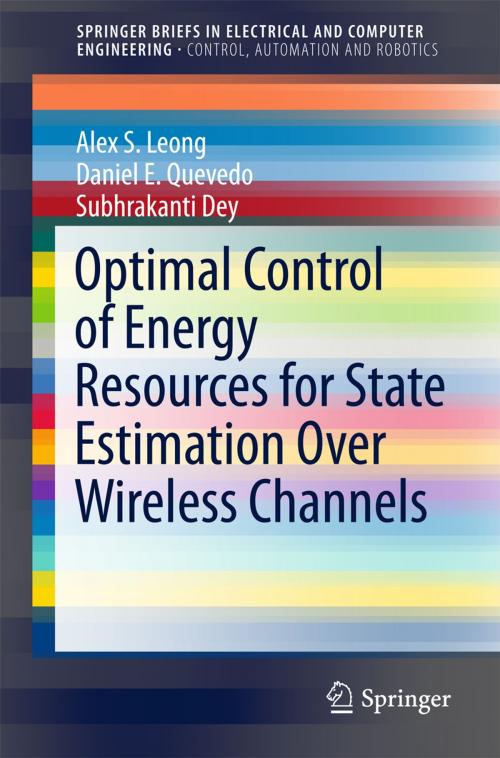Optimal Control of Energy Resources for State Estimation Over Wireless Channels
Nonfiction, Science & Nature, Technology, Automation, Computers, Advanced Computing, Information Technology| Author: | Alex S. Leong, Daniel E. Quevedo, Subhrakanti Dey | ISBN: | 9783319656144 |
| Publisher: | Springer International Publishing | Publication: | August 16, 2017 |
| Imprint: | Springer | Language: | English |
| Author: | Alex S. Leong, Daniel E. Quevedo, Subhrakanti Dey |
| ISBN: | 9783319656144 |
| Publisher: | Springer International Publishing |
| Publication: | August 16, 2017 |
| Imprint: | Springer |
| Language: | English |
This brief introduces wireless communications ideas and techniques into the study of networked control systems. It focuses on state estimation problems in which sensor measurements (or related quantities) are transmitted over wireless links to a central observer.
Wireless communications techniques are used for energy resource management in order to improve the performance of the estimator when transmission occurs over packet dropping links, taking energy use into account explicitly in Kalman filtering and control. The brief allows a reduction in the conservatism of control designs by taking advantage of the assumed.
The brief shows how energy-harvesting-based rechargeable batteries or storage devices can offer significant advantages in the deployment of large-scale wireless sensor and actuator networks by avoiding the cost-prohibitive task of battery replacement and allowing self-sustaining sensor to be operation. In contrast with research on energy harvesting largely focused on resource allocation for wireless communication systems design, this brief optimizes estimation objectives such as minimizing the expected estimation error covariance. The resulting power control problems are often stochastic control problems which take into account both system and channel dynamics. The authors show how to pose and solve such design problems using dynamic programming techniques.
Researchers and graduate students studying networked control systems will find this brief a helpful source of new ideas and research approaches.
This brief introduces wireless communications ideas and techniques into the study of networked control systems. It focuses on state estimation problems in which sensor measurements (or related quantities) are transmitted over wireless links to a central observer.
Wireless communications techniques are used for energy resource management in order to improve the performance of the estimator when transmission occurs over packet dropping links, taking energy use into account explicitly in Kalman filtering and control. The brief allows a reduction in the conservatism of control designs by taking advantage of the assumed.
The brief shows how energy-harvesting-based rechargeable batteries or storage devices can offer significant advantages in the deployment of large-scale wireless sensor and actuator networks by avoiding the cost-prohibitive task of battery replacement and allowing self-sustaining sensor to be operation. In contrast with research on energy harvesting largely focused on resource allocation for wireless communication systems design, this brief optimizes estimation objectives such as minimizing the expected estimation error covariance. The resulting power control problems are often stochastic control problems which take into account both system and channel dynamics. The authors show how to pose and solve such design problems using dynamic programming techniques.
Researchers and graduate students studying networked control systems will find this brief a helpful source of new ideas and research approaches.















